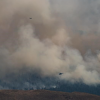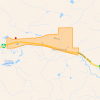Large parts of western British Columbia could be vulnerable to an invasion of Asian giant hornets, a new study has found.
The research, undertaken by scientists in Washington, is based on habitat suitability models and dispersal simulations.
It looks at where the hornet – Vespa mandarinia – could live and how it could spread.
The vicious predator, which poses a serious threat to defenceless honey bees and can also injure and even kill humans, has been found in western North America in recent years.

A nest of the hornets was found on Vancouver Island in Sept. 2019 and the insects have also been found in Oregon and Washington.
The simulations show the hornet could “rapidly spread throughout western North American without containment.”
“Given its potential negative impacts and capacity for spread, extensive monitoring and eradication efforts throughout western North America are warranted,” the study explains.
The hornet is best-suited to regions with “low to warm temperatures and high precipitation,” the scientists said.

“Such areas occur across western North America, eastern North America, Europe, northwestern and southeastern South America, central Africa, eastern Australia, and New Zealand."
The hornet’s spread could cause serious damage to honey bee populations, with European populations seeing declines of up to 50%.
“Our results [...] indicate that eradication efforts should assume a rapid expansion rate, such that trapping to detect introductions should be conducted throughout western North America,” the scientists concluded.
“Given that [the hornet] is not yet widely established, targeted monitoring and eradication efforts could prevent further spread of this damaging invader.”
















